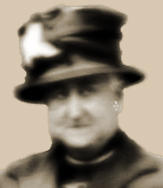"There's the wind on the heath, brother"
On those occasions when the conversations between Lady Bracknell and her equally-enfeebled friends turn to the process of coming to terms with the restrictions imposed by an acquired, or a degenerating, impairment, her ladyship often recalls a passage from George Borrow's work of fiction, "Lavengro", which she was set as an English comprehension passage when she was a school girl.
Lavengro is set in the early years of the nineteenth century. The book's narrator – whose name we never learn – describes his life as the son of a soldier. His family moves all over the country and, being a natural linguist, the boy is soon fluent in the Scots, Irish, Welsh and Romany languages. From time to time, he meets up with Jasper Petulengro, a Romany king whom he first met when he was very young.
In the scene which Lady Bracknell has reproduced below, the narrator has just turned eighteen and his spirits are very low as he has realised that he has no trade and possibly, therefore, no future. He meets his friend Jasper:
Lavengro is set in the early years of the nineteenth century. The book's narrator – whose name we never learn – describes his life as the son of a soldier. His family moves all over the country and, being a natural linguist, the boy is soon fluent in the Scots, Irish, Welsh and Romany languages. From time to time, he meets up with Jasper Petulengro, a Romany king whom he first met when he was very young.
In the scene which Lady Bracknell has reproduced below, the narrator has just turned eighteen and his spirits are very low as he has realised that he has no trade and possibly, therefore, no future. He meets his friend Jasper:
Jasper: Life is sweet, brother
Narrator: Do you think so?
Jasper: Think so! – There’s night and day, brother, both sweet things; sun, moon and stars brother, all sweet things. There’s likewise a wind on the heath. Life is very sweet brother; who would wish to die?
Narrator: I would wish to die.
Jasper: You talk like a giorgio – which is the same as talking like a fool – were you a Romany chal you would talk wiser. Wish to die indeed! – A Romany chal would wish to live for ever!
Narrator: In sickness, Jasper?
Jasper: There’s the sun and the stars, brother.
Narrator: In blindness, Jasper?
Jasper: There’s the wind on the heath, brother; if I could only feel that, I would gladly live for ever.
As a result of her long-standing familiarity with this passage from what she does not consider to be otherwise, in all honesty, an especially riveting volume, Lady Bracknell, almost from the earliest stages of her impairment, was willing to try to identify her own personal "wind on the heath", so that she could hold on to the conviction that experiencing a staggeringly large diminution in one's physical capabilities is not without its compensations.
To this day, she finds the phrase to be a useful shorthand response to those well-meaning persons in rude physical health who ask her, with pity oozing from their every pore, how she copes?
Should any of Lady Bracknell's readers have a favoured quotation of their own to which they turn when things appear bleak, they are warmly encouraged to recount it via the comments facility.
Should any of Lady Bracknell's readers have a favoured quotation of their own to which they turn when things appear bleak, they are warmly encouraged to recount it via the comments facility.











6 Comments:
Thank you Lady B. I have not come across this work before. It is a useful passage to remember when one is feeling low. I myself ahve always been aware that no matter how down and in pain I am there is always tomorrow and tomorrow has the possibilty of being better than today. And that is something that I would hate to miss out on.
Our birth is but a sleep and a forgetting:
The Soul that rises with us, our life's Star,
Hath had elsewhere its setting,
And cometh from afar:
Wordsworth: Ode on the Intimations of Immortality
I hope your Ladyship forgives my early morning doze ridden state, but I am uncertain as to what actually constitutes a 'heath.' I have reason to believe it is a 'large, open area made up of sandy soil and scrubby vegetation'. If that description is correct than I can proudly declare that my own back garden is indeed a strong contender for being titled a 'heath'. Although something is nagging me about width, depth and location. Maybe the 'large' and 'open' bits might rule it out from being upgraded to such giddy heights as 'heath'. Perhaps it will forever remain as 'woefully neglected lawn'. Sigh.
Apparently my grandmother, who died in 2005 at age 100 (close to 101!), often quoted these lines in the weeks leading up to her death: "There’s night and day, brother, both sweet things; sun, moon and stars brother, all sweet things. There’s likewise a wind on the heath. Life is very sweet brother".
There is something surprisingly gratifying in discovering that one is not alone in one's obscure literary preferences.
Lady Bracknell is most grateful to her anonymous contributor for taking the time to pass on that information about his or her grandmother who, her ladyship has no doubt, must have been a lady of indomitable character.
Given that I'm posting this comment more than a year late, I don't know if anyone will see this -- but Ballastexistenz (aka Amanda Baggs) has written a great essay on this topic:
http://ballastexistenz.autistics.org/?p=204
Andrea
http://reunifygally.wordpress.com
Post a Comment
<< Home